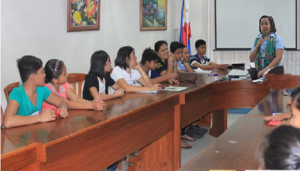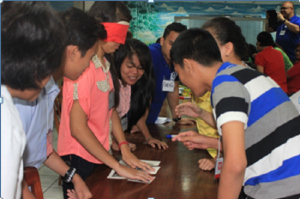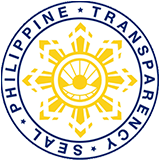 In preparation for the coming implementation of Pantawid Pamilya high school age expansion to include 15-18 years old children-beneficiaries, the Department of Social Welfare and Development (DSWD) in partnership withthe University of the Philippines – Los Baños (UP-LB), conducted a series of workshops for the creation of new FDS module wherein the pilot participants are the PantawidPamilya beneficiaries from Metro Manila.
In preparation for the coming implementation of Pantawid Pamilya high school age expansion to include 15-18 years old children-beneficiaries, the Department of Social Welfare and Development (DSWD) in partnership withthe University of the Philippines – Los Baños (UP-LB), conducted a series of workshops for the creation of new FDS module wherein the pilot participants are the PantawidPamilya beneficiaries from Metro Manila.
With this, a total of 15 children-beneficiaries who are within the age range of 13-16 and 10 Parent Leaders from the seven (7) LGUs in National Capital Region where Set 1 beneficiaries came from namely; Manila, Quezon City, Caloocan, Pasay, Pasig,Navotas and Taguig, were invited to attend the activity.
DSWD-NCR Regional Director Ma. Alicia S. Bonoan, in her welcome remarks, expressed her gratitude that the beneficiaries of NCR were among the participants of this study in crafting the new FDS module for adolescents. She also reminded the participants that they play a crucial role in the creation of the new FDS module as they represent the PantawidPamilya beneficiaries of Luzon; thus, their inputs on its creation will be carried in the final module to be used by adolescent-beneficiaries for the conduct of their future FDS.
Director Bonoan also emphasized that this served as an opportunity for the chosen Parent Leaders and children-beneficiaries to take part in the creation of new FDS module that will help to address the issues and concerns of adolescents, which will bedetermined at the end of the workshops.
Meanwhile, the same workshops were also held inVisayas and Mindanao clusters on April 2-3, 2014 in Regions VII and CARAGA, respectively.
The workshop specifically aims to: 1. Establish a profile of the Filipino adolescents based on the perception of adolescents and adults in their community; 2. Identify potential risk factors in adolescence and their perceive causes; 3. Enumerate life areas in which adolescents feel they need more training about; 4. List down potential interventions to address risk factors based on adolescents’ and adults’ viewpoints; and 5. Gauge readiness and willingness of adolescents to participatein future Family Development Sessions.
The high school expansion of the PantawidPamilya program was in response to the research findings that high school graduate earns a higher wage than those of the elementary graduates. This also serves as complementation to the K – 12 program of the Department of Education (DepED) wherein at the age of 18, a childalreadyfinished his/hersecondary education.###




